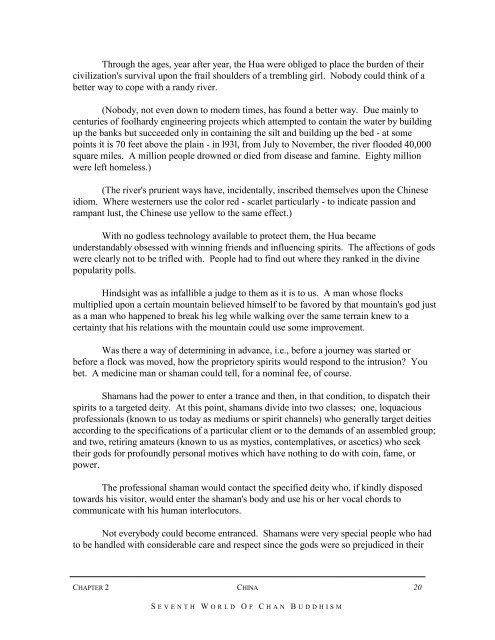seventh world of chan buddhism - Zen Buddhist Order of Hsu Yun
seventh world of chan buddhism - Zen Buddhist Order of Hsu Yun
seventh world of chan buddhism - Zen Buddhist Order of Hsu Yun
Create successful ePaper yourself
Turn your PDF publications into a flip-book with our unique Google optimized e-Paper software.
Through the ages, year after year, the Hua were obliged to place the burden <strong>of</strong> their<br />
civilization's survival upon the frail shoulders <strong>of</strong> a trembling girl. Nobody could think <strong>of</strong> a<br />
better way to cope with a randy river.<br />
(Nobody, not even down to modern times, has found a better way. Due mainly to<br />
centuries <strong>of</strong> foolhardy engineering projects which attempted to contain the water by building<br />
up the banks but succeeded only in containing the silt and building up the bed - at some<br />
points it is 70 feet above the plain - in l93l, from July to November, the river flooded 40,000<br />
square miles. A million people drowned or died from disease and famine. Eighty million<br />
were left homeless.)<br />
(The river's prurient ways have, incidentally, inscribed themselves upon the Chinese<br />
idiom. Where westerners use the color red - scarlet particularly - to indicate passion and<br />
rampant lust, the Chinese use yellow to the same effect.)<br />
With no godless technology available to protect them, the Hua became<br />
understandably obsessed with winning friends and influencing spirits. The affections <strong>of</strong> gods<br />
were clearly not to be trifled with. People had to find out where they ranked in the divine<br />
popularity polls.<br />
Hindsight was as infallible a judge to them as it is to us. A man whose flocks<br />
multiplied upon a certain mountain believed himself to be favored by that mountain's god just<br />
as a man who happened to break his leg while walking over the same terrain knew to a<br />
certainty that his relations with the mountain could use some improvement.<br />
Was there a way <strong>of</strong> determining in advance, i.e., before a journey was started or<br />
before a flock was moved, how the proprietory spirits would respond to the intrusion? You<br />
bet. A medicine man or shaman could tell, for a nominal fee, <strong>of</strong> course.<br />
Shamans had the power to enter a trance and then, in that condition, to dispatch their<br />
spirits to a targeted deity. At this point, shamans divide into two classes; one, loquacious<br />
pr<strong>of</strong>essionals (known to us today as mediums or spirit <strong>chan</strong>nels) who generally target deities<br />
according to the specifications <strong>of</strong> a particular client or to the demands <strong>of</strong> an assembled group;<br />
and two, retiring amateurs (known to us as mystics, contemplatives, or ascetics) who seek<br />
their gods for pr<strong>of</strong>oundly personal motives which have nothing to do with coin, fame, or<br />
power.<br />
The pr<strong>of</strong>essional shaman would contact the specified deity who, if kindly disposed<br />
towards his visitor, would enter the shaman's body and use his or her vocal chords to<br />
communicate with his human interlocutors.<br />
Not everybody could become entranced. Shamans were very special people who had<br />
to be handled with considerable care and respect since the gods were so prejudiced in their<br />
CHAPTER 2 CHINA<br />
S EVENTH W ORLD O F C HAN B UDDHISM<br />
20


